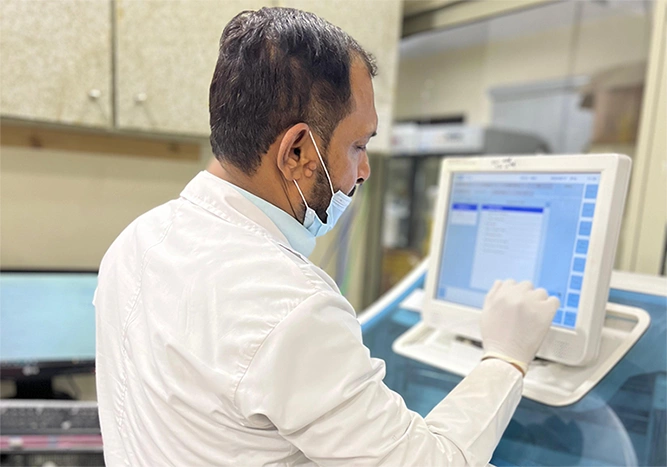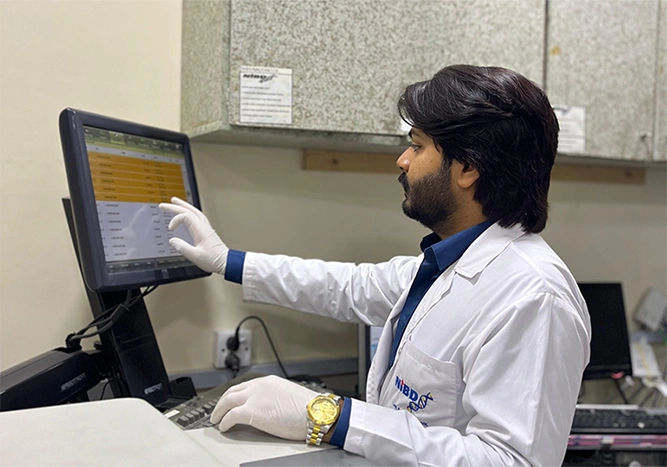Blood Bank
Blood Bank
The Blood Bank Department at the NIBD Blood Bank is a critical component of our healthcare system, dedicated to the collection, processing, testing, storage, and distribution of blood and blood products.
Our mission is to ensure a safe and adequate blood bank in Karachi supply to meet the transfusion needs of our patients, particularly those undergoing treatments for haematological and oncological conditions. The department adheres to the highest standards of safety, quality, and ethical practice.
Our blood bank caters to more than 10,000 blood donations annually.


1. Blood Collection
The Blood Bank is responsible for the collection of blood from voluntary donors, ensuring a safe and adequate blood supply:
- Donor Recruitment and Retention: Implementing strategies to recruit and retain voluntary, non-remunerated blood donors.
- Donor Screening: Conducting thorough medical and health screenings to ensure donor eligibility and safety.
- Blood Donation Process: Facilitating whole blood and apheresis donations in a comfortable and safe environment.
- Donor Education and Counseling: Providing information and support to donors about the donation process, benefits, and post-donation care.
2. Blood Processing and Component Preparation
Once collected, blood is processed and separated into its various components to maximise its therapeutic use:
- Component Separation: Separating whole blood into red blood cells, platelets, plasma, and cryoprecipitate.
- Leukoreduction: Removing white blood cells from blood products to reduce the risk of febrile reactions and immunization.
3. Testing and Quality Control
Ensuring the safety and quality of blood products through rigorous testing and quality control measures:
- Infectious Disease Screening: Testing all blood donations for infectious diseases, including HIV, hepatitis B and C, syphilis, and other transfusion-transmissible infections.
- Blood Typing and Antibody Screening: Determining ABO and Rh blood types and screening for unexpected antibodies to ensure compatibility.
- Quality Control Testing: Performing regular quality control tests on blood products to ensure they meet established standards.
4. Blood Storage and Inventory Management
Proper storage and inventory management of blood products to ensure their availability and efficacy:
- Storage Conditions: Maintaining optimal storage conditions for different blood components, including refrigeration for red blood cells and freezing for plasma.
- Inventory Management: Implementing robust inventory management systems to track blood products and ensure timely replenishment.
- Shelf-Life Monitoring: Monitoring the expiration dates of blood products to ensure their viability and safety for transfusion.
5. Transfusion Services
Providing comprehensive transfusion services to meet the clinical needs of patients:
- Crossmatching: Performing compatibility testing between donor and recipient blood samples to ensure safe transfusions.
- Transfusion Support: Supplying blood products for various clinical indications, including surgery, trauma, cancer treatment, and hematologic disorders.
- Emergency Preparedness: Ensuring the availability of blood products for emergency situations and mass casualty events.
6. Specialized Blood Products and Services
Offering specialised blood products and services to meet specific patient needs:
- Irradiated Blood Products: Providing irradiated blood components to prevent transfusion-associated graft-versus-host disease (TA-GvHD) in immunocompromised patients.
- Washed Red Blood Cells: Preparing washed red blood cells to remove plasma proteins and reduce the risk of allergic reactions in sensitive patients.
- HLA-Matched Platelets: Providing HLA-matched platelets for patients with refractory platelet transfusions due to alloimmunization.
- Therapeutic Apheresis: Performing therapeutic apheresis procedures to treat various medical conditions, including plasma exchange and red cell exchange.
Education and Training
The Blood Bank is committed to the continuous education and training of its staff and the wider medical community:
- Staff Training Programs: Providing comprehensive training programs for blood bank staff to ensure proficiency in blood collection, processing, testing, and transfusion practices.
- Continuing Education: Offering ongoing education and professional development opportunities to keep staff updated on the latest advancements and best practices in transfusion medicine.
- Community Education: Conducting outreach and educational programs to raise awareness about the importance of blood donation and transfusion safety.
Research and Innovation
The Blood Bank at NIBD is actively involved in research and innovation to improve transfusion practices and patient outcomes:
- Clinical Research: Participating in clinical research studies to advance the understanding of transfusion medicine and develop new treatment protocols.
- Technology Integration: Implementing advanced technologies and automation to enhance the efficiency and accuracy of blood bank operations.
- Quality Improvement Initiatives: Continuously evaluating and improving blood bank processes to ensure the highest standards of safety and quality.
Quality Assurance
The Blood Bank adheres to stringent quality assurance practices and is accredited by national and international regulatory bodies:
- Compliance with Standards: Ensuring compliance with standards set by regulatory agencies such as AABB (formerly the American Association of Blood Banks), and other relevant organisations.
- External Audits and Inspections: Participating in regular external audits and inspections to verify compliance and maintain accreditation.
- Internal Quality Audits: Conducting internal quality audits to identify areas for improvement and ensure continuous compliance with quality standards.
Commitment to Excellence
The Blood Bank at NIBD is dedicated to providing safe, reliable, and high-quality blood bank services and products to support patient care:
- Patient-Centred Approach: Focusing on the needs and well-being of patients in all aspects of blood bank operations.
- Ethical Practices: Upholding the highest ethical standards in donor recruitment, blood collection, and transfusion practices.
- Collaboration and Teamwork: Working closely with healthcare providers, researchers, and the community to enhance transfusion medicine and improve patient outcomes.
© 2026 Medikaid. All rights reserved — Made by DeoThemes

